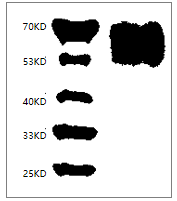| Product name | Human CD86/B7-2 protein, His tag (Animal-Free) |
| Sequence | Amino acid sequence derived from human CD86 (NP_787058) (Met1-Pro247) was expressed with a 6 His tag at the C-terminus. |
| Protein length | The recombinant human CD86 consists of 230 amino acids and predicts a molecular mass of 26.2 KD. It migrates as an approximately 42-66 KD band in SDS-PAGE under reducing conditions due to glycosylation. |
| Preparation method | HEK293 Cells |
| Purity | >95% as determined by SDS-PAGE |
| Alternative | T-lymphocyte activation antigen CD86; Activation B7-2 antigen; CD86 |
| Formulation | Lyophilized from sterile PBS, pH 7.4. |
| Features & Benefits | Endotoxin: < 1.0 EU per µg of the protein as determined by the LAL method. |
| Molecular weight | 26.2 KD |
| Usage notes | Always centrifuge tubes before opening. It is recommended to reconstitute the lyophilized Human CD86/B7-2 protein using the buffer we provided not less than 100 µg/ml, which can then be further diluted to other aqueous solutions. |
| Storage instructions | Lyophilized Human CD86/B7-2 protein, His tag (Animal-Free)should be stored desiccated below -20°C. Upon reconstitution, the protein should be stored at 4°C between 2-7 days and for future use below -20°C. For long term storage it is recommended to add a carrier protein (0.22% HSA or BSA). Please prevent freeze-thaw cycles. |
| Shipping | The product is shipped at ambient temperature. |
| Precautions | The product listed herein is for research use only and is not intended for use in human or clinical diagnosis. Suggested applications of our products are not recommendations to use our products in violation of any patent or as a license. We cannot be responsible for patent infringements or other violations that may occur with the use of this product. |
| Background | Cluster of Differentiation 86 (CD86) is also known as B-lymphocyte activation antigen B7-2, is a type I membrane protein that is a member of the immunoglobulin superfamily, and is constitutively expressed on interdigitating dendritic cells, Langerhans cells, peripheral blood dendritic cells, memory B cells, and germinal center B cells. B7-2 exists predominantly as a monomer on cell surfaces and interacts with two co-stimulatory receptors CD28 and cytotoxic T lymphocyte-associated antigen 4 (CTLA-4) expressed on T cells, and thus induces the signal pathways which regulate T cell activation and tolerance, cytokine production, and the generation of CTL. It is indicated that contacts between B and T helper cells mediated by CD86 encourage signals for the proliferation and IgG secretion of normal B cells and B cell lymphomas. Recent study has revealed that CD86 also promotes the generation of a mature APC repertoire and promotes APC function and survival. CD86 has an important role in chronic hemodialysis, allergic pulmonary inflammation, arthritis, and antiviral responses, and thus is regarded as a promising candidate for immune therapy. |
| Gene ID | 942 |
| Alternative | T-lymphocyte activation antigen CD86; Activation B7-2 antigen; CD86 |
| Accession | P42081 |

Fig. SDS-PAGE analysis of Human CD86/B7-2 protein, His tag.
You must be logged in to post a review.
1.The species of antibody reactivity should be the sample species that can be matched normally after Abbkine R&D experts have passed strict scientific verification. If your sample is not within the range of reactivity, in order to improve the efficiency and results of your experiment, it is not suggested to try other species. Otherwise, it may lead to sample mismatch and affect the effect of your experiment.
2.Please aliquot the antibody received as soon as possible and store it at -20℃, avoid repeated freezing and thawing, and use it within one year.
Welcome any form of communications, and better service will be provided here.
Tell: +1-404-854-0155
Email: service@abbkine.com
Support Email: support@abbkine.com
Address: 3052 Stroop Hill Road, Apt 203, Atlanta 30303, Georgia, United States of America




Reviews
There are no reviews yet.